Key takeaways:
- Water conservation methods, such as drip irrigation and rainwater harvesting, can significantly reduce water usage in car washes and other settings.
- Adopting technologies like water recycling systems and biodegradable soaps can effectively minimize water waste while enhancing cleaning performance.
- Community engagement and localized adaptations are crucial for implementing effective water conservation measures, particularly during times of water shortages.
- Personal experiences in car washing highlight the importance of choosing sustainable methods and creating a connection with environmental responsibility.
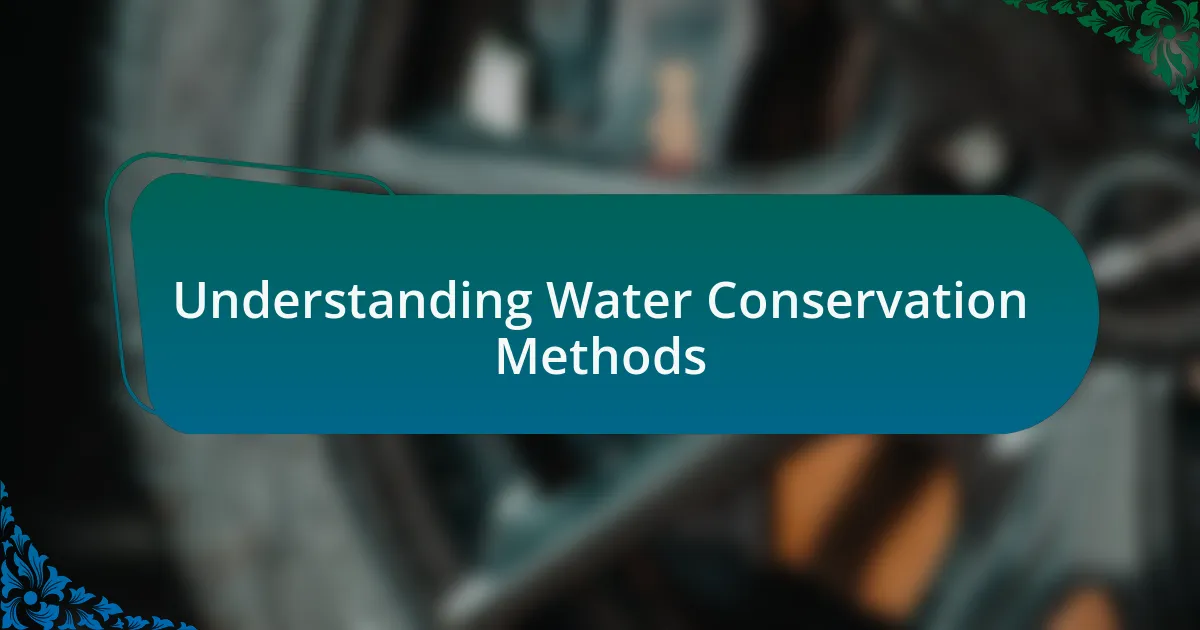
Understanding Water Conservation Methods
Water conservation methods are essential, especially in settings like car washes where water usage can quickly escalate. I remember a time when I visited a car wash and was shocked at the sheer volume of water flowing through the system. It made me wonder, how much of that could have been saved with better techniques?
Drip irrigation and rainwater harvesting are two methods that always resonate with me when I think about efficient water use. I once set up a simple rain barrel system at home, and witnessing the rainwater being stored for later use felt incredibly rewarding. Have you ever experienced that moment of satisfaction when you know you’re making a tangible difference in conserving resources?
Moreover, understanding the impact of technologies like waterless car washes can shift our perspective entirely. I was skeptical at first until I tried it and was amazed at the results. Not only did my car look as good as new, but I also realized that I was saving gallons of water with each wash. Isn’t it fascinating how simple changes can lead to significant changes in our water footprint?
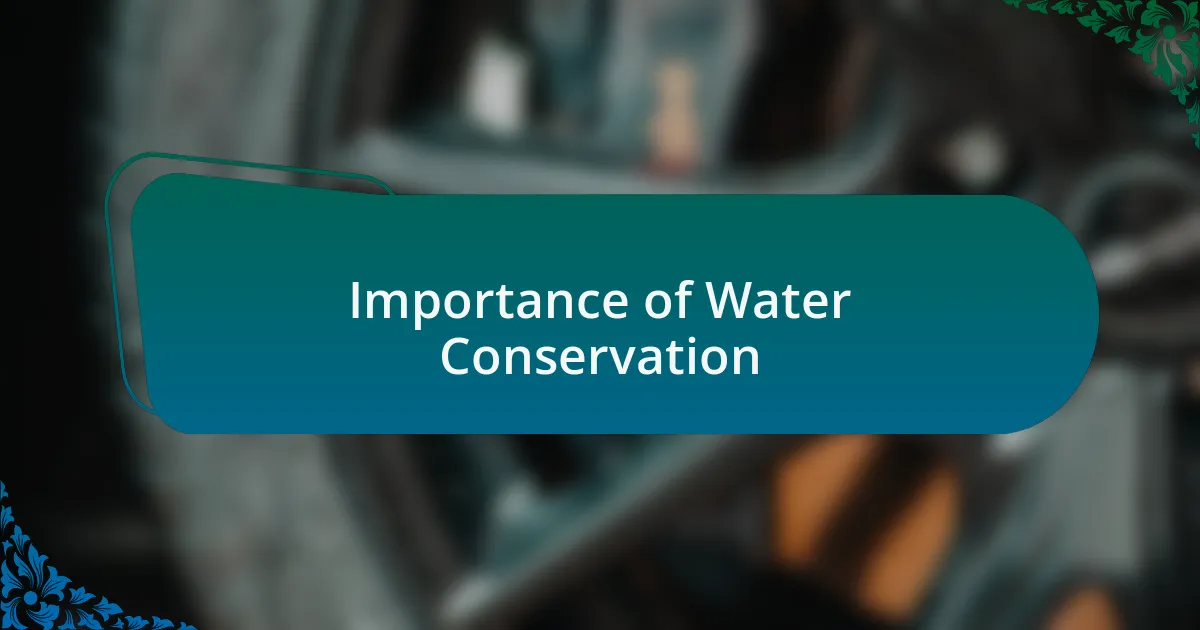
Importance of Water Conservation
Water conservation is crucial for sustaining our natural resources and ensuring that future generations have access to clean water. I recall a time when my community faced severe drought conditions, and it opened my eyes to the fragility of our water supply. It made me ask myself: what if every small action we took had a ripple effect on the larger environment?
Every drop counts, especially in industries like car washes, where excess water use can be easily minimized. I once participated in a community initiative that taught us how simple adjustments could drastically reduce water consumption. By implementing these strategies, we not only preserved vital resources but also instilled a sense of responsibility toward our environment.
Moreover, the importance of water conservation transcends just savings; it fosters a deeper connection with our surroundings. When I garden, I always think about the significance of every sip my plants take — it’s a reminder of the larger ecosystem at play. Can we truly afford to overlook the smallest droplets that nurture both flora and fauna? Each conservation effort can strengthen our relationship with nature and promote a collective commitment to preserving our planet for the long term.
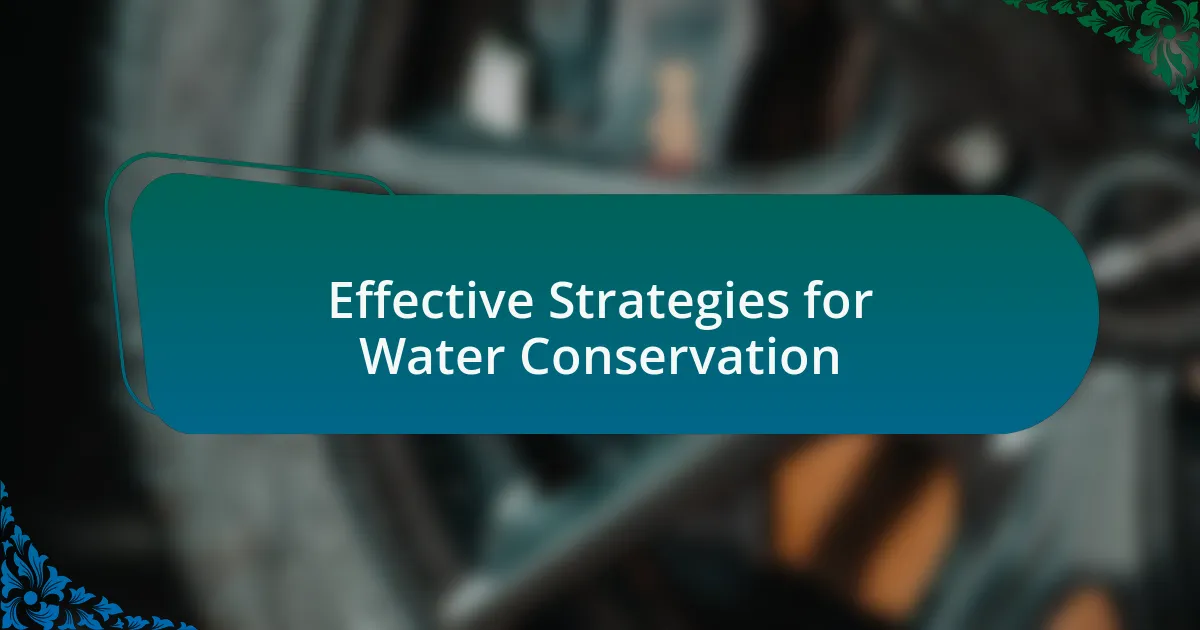
Effective Strategies for Water Conservation
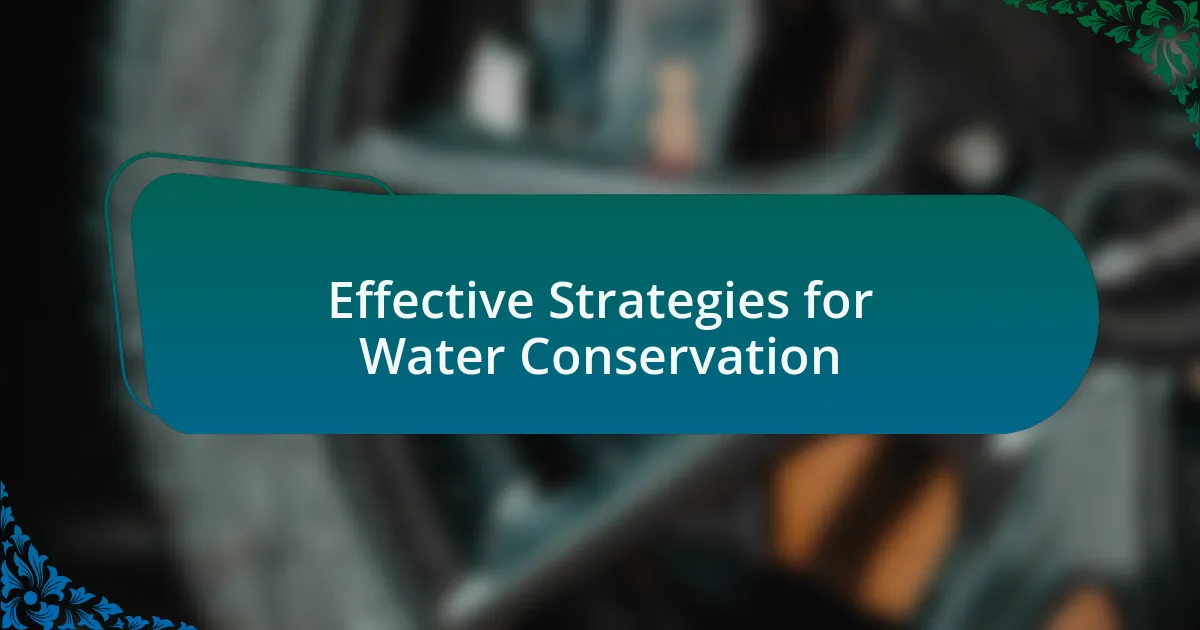
Effective Strategies for Water Conservation
One of the most effective strategies I’ve discovered is employing a water recycling system in car washes. When I first learned about the mechanics behind it, I was amazed at how a simple setup could filter and reuse water, drastically cutting down on the amount needed per wash. Why wouldn’t we harness technology to help us reduce waste?
Another approach I found impactful is scheduling washes during cooler hours. When I started washing my car early in the morning, I noticed not just a reduction in water evaporation but also a sense of satisfaction knowing that I was being mindful of our resources. This leads me to ask: wouldn’t it feel great to wash with purpose, knowing I’m making a difference?
I also advocate for using biodegradable soaps — not only do they clean effectively, but they also minimize environmental impact. There was a moment when I washed my car with these products and saw how well they performed without harming local water systems. Isn’t it refreshing to know that every choice can contribute to a healthier planet? Each decision, big or small, reinforces the need for conscious living in our daily routines.

Best Practices for Car Wash
When it comes to the best practices for car washes, ensuring that your equipment is well-maintained is crucial. I remember a time when I neglected the upkeep of my pressure washer, and it led to not just wasted water, but also an uneven wash that left my car looking less than stellar. Regular checks can mean the difference between an efficient wash and unnecessary waste — isn’t that a lesson learned the hard way?
Using a foam cannon attachment has also transformed my car washing routine. I found it achieves a thick layer of suds while using significantly less water compared to traditional methods. The first time I saw my vehicle covered in foam, I felt a rush of excitement, knowing that I was cleaning effectively and conserving at the same time. Have you considered how a few simple adjustments could elevate your washing experience?
Lastly, integrating dry methods like microfiber towels can drastically cut down on water use. I vividly remember switching from regular rags to high-quality microfiber — the difference was astounding. Not only did my car shine brighter, but I felt proud of my decision to save water in such an impactful way. Isn’t it amazing how the right tools can change our everyday habits for the better?

Personal Experience with Car Wash
There’s something undeniably satisfying about the anticipation before a car wash. I clearly remember the first time I used a self-serve car wash. As I pulled up to the bay, the scent of soap and fresh water filled the air, and it felt like I was stepping into a small oasis dedicated to my car’s well-being. Who knew a simple rinse could provide such a refreshing mental break?
During my visits, I’ve developed a routine that feels almost meditative. I usually take my time soaking in the process, feeling connected to my vehicle as I navigate through the steps. One rainy afternoon, I decided to have a little fun, and transformed the wash into a mini-playground by harnessing the power of the soap spray. Laughter echoed as I watched the foam create a whimsical dance on the windshield. It’s moments like these that remind me a car wash can be both practical and joyous.
After these experiences, I’ve realized that my choice of wash determines not only the outcome for my car but also my water usage. Opting for wash locations that recycle water truly resonates with me. I recall feeling a sense of fulfillment when I discovered a facility that not only cleaned my car but also contributed to a sustainable approach. It made me reflect: isn’t it crucial to align our personal habits with our responsibility toward the environment?
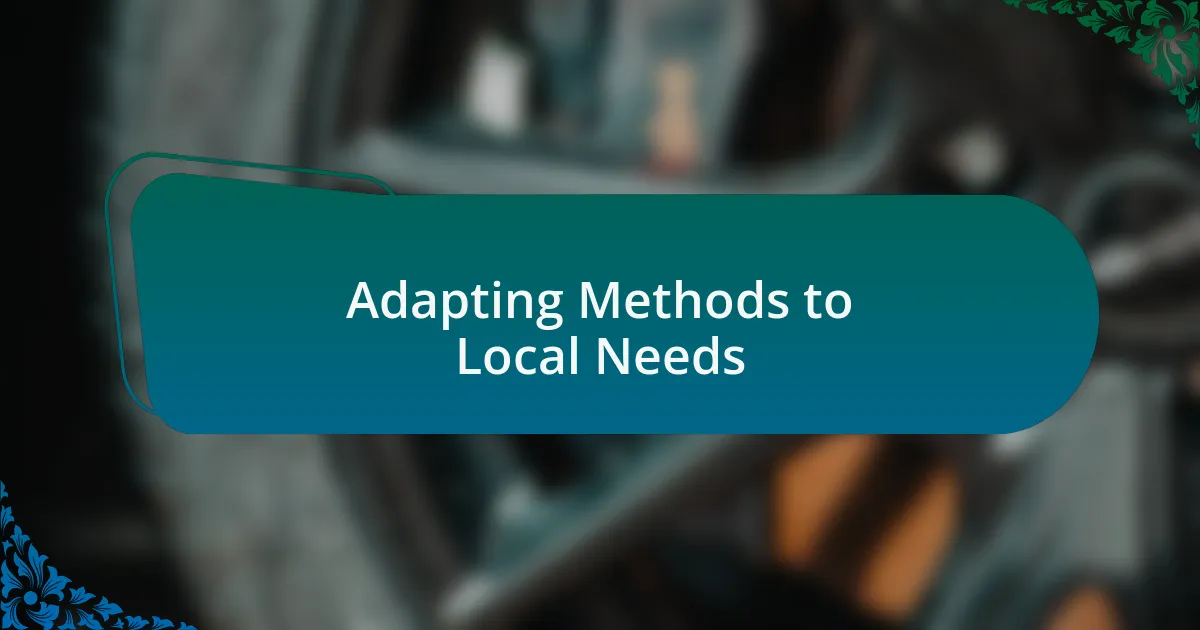
Adapting Methods to Local Needs
Adapting water conservation methods to the specific needs of a community is essential. For instance, in my neighborhood, we often face water shortage during the dry season. By implementing car wash programs that collect rainwater or utilize greywater systems, local businesses can enhance sustainability while meeting the cleaning demands of residents without affecting the overall water supply.
I’ve seen firsthand how car washes near major highways adapt to their surroundings by including dry car wash options, especially during peak tourist seasons. This approach not only saves water but also offers travelers quick, efficient service. It’s these localized adaptations that truly create a win-win situation for service providers and customers alike.
When discussing local water conservation, I often ponder: how can we collectively push for better practices? Engaging in community forums and supporting local initiatives can make a significant difference. Sharing insights about successful strategies and embracing new technologies ensures that our car cleaning practices continue to evolve in harmony with the environment.